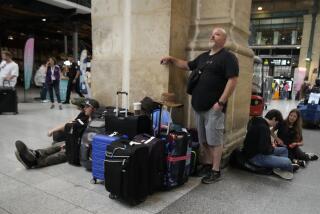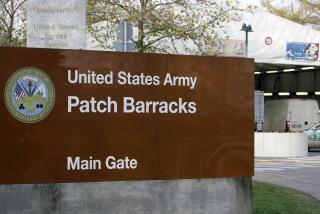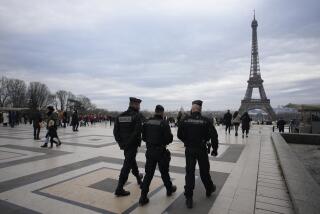French on Alert for Bombings : Europe
- Share via
France: Soldiers took up posts at the Eiffel Tower, the Arc de Triomphe and other high-visibility spots in Paris, part of a mobilization of 1,800 troops to reassure tourists and the French public amid a wave of terrorist bombings. At press time Wednesday, the count stood at six bombings or attempted bombings since late July. So far, only the first was fatal--seven killed and 84 injured in an explosion aboard a rush-hour subway train. In the most recent, a car bomb injured at least 14 people outside a Jewish school in a suburb of Lyon. Three of the six devices were defective. There have been no credible claims of responsibility, but police are focusing on Islamic militants with ties to Algeria, a former French colony, and have arrested dozens of suspects.
South Pacific
Tahiti: The paradisiacal image of the French Polynesian island was marred by a day of rioting earlier this month in Papeete, the capital, over France’s resumption of nuclear testing in the region. A day after the first underground test at Mururoa Atoll, 750 miles to the southeast, hundreds of demonstrators fought with police, set fire to cars and shops, used an earthmover to smash their way into the Papeete airport, and set fire to the terminal, according to Times’ staff and wire reports. At least 16 people were reported injured in the violence, and the French government flew troop reinforcements to the island. Travelers considering trips to Tahiti should carefully monitor the status of nuclear testing and the political climate in French Polynesia, according to the State Department.
Russia
Airline fatalities in the former Soviet Union were proportionately seven times the worldwide average last year, according to a grim new Los Angeles Times assessment. Moscow correspondent Carol J. Williams reports that Russia is the global headquarters for hijacks and airborne terrorism. Problems multiplied alarmingly after the breakup of the Aeroflot monopoly in 1991. Most of the 15,000 landing sites in the former Soviet Union are overdue for replacement, air traffic controllers are poorly equipped and Russian airports are overcrowded. The Federal Aviation Administration helped Russia review air safety this year, and conditions improved somewhat. But the State Department notes that “air travel within Russia is often unreliable.”
Africa
Kenya: Two attacks on foreigners on the same day last month--both in a Nairobi suburb, both centering on the theft of vehicles--dramatized the rise in violent crime in Kenya this year. In one, the headmaster of the Japanese community school was shot to death; in the other, a female British diplomat was shot and wounded. In each case, carjackers targeted an expensive four-wheel-drive vehicle of the sort favored by expatriates. Armed carjackings are becoming increasingly common around Nairobi, according to the Reuters news service. Kenya’s top police official noted an increase this year in various types of violent crime, and the State Department reports a high rate of street crime against tourists in downtown Nairobi and Mombasa and at coastal beach resorts.
Briefly . . .
Montserrat: Volcanic activity has increased ominously on the island, a British dependency in the West Indies, and two-thirds of the population have been relocated. The State Department advises would-be travelers to check first with the U.S. Embassy in Barbados at (809) 431-0225.
Galapagos Islands: Demanding the exclusion of all tourists except Ecuadoreans, residents of the Ecuadorean island group blocked the entrance to Charles Darwin National Park on Santa Cruz Island earlier this month. Others prevented a cruise ship from discharging passengers at Baltra Island. Ecuadorean marines have been sent to restore order.
Turkey: Two people were killed and about 40 injured late last month in four terrorist bombings in areas of Istanbul popular with tourists, Reuters reported. The two fatalities occurred when two bombs exploded near a mosque.
Hot spots: The State Department has dropped Peru from the list of countries where Americans are warned not to travel. Remaining on the list are Afghanistan, Algeria, Angola, Bosnia-Herzegovina, Burundi, Colombia, Croatia, Guatemala, Iran, Iraq, Lebanon, Liberia, Libya, Nigeria, North Korea, Rwanda, Serbia and Montenegro, Sierra Leone, Somalia, Sudan and Tajikistan.
The U.S. State Department offers recorded travel warnings and advisories at (202) 647-5225; the fax line is (202) 647-3000.
* Wright ‘ s column appears monthly.
More to Read
Sign up for Essential California
The most important California stories and recommendations in your inbox every morning.
You may occasionally receive promotional content from the Los Angeles Times.













